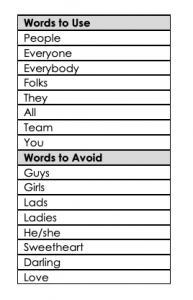Gender bias is a topic that, in recent years, has been largely debated as a source of tension in the workplace. Research from Samsung UK and Ireland suggests that the issue of gender bias continues to present itself. A poll found women are asked to make tea or coffee almost three times (42%) more than men (16%).
Despite discrimination laws and the recent push for widespread inclusivity, Samsung’s latest survey found women are made the target of sexist jokes almost three times more than men (43% vs 15%). Employees were found to be using biased language on average four times a week (80%), with almost half (46%) revealing that gender biased language is showing up at work both formally and informally. One in three (30%) have even experienced biased language during an interview, which is particularly concerning from a workplace discrimination perspective.
Instances where women are referred to as “sweetheart”, “darling” or “being called a girl”, are contributing to employees feeling dismissed and undervalued. This feeling encompasses men too, where they equally feel put out when gender biased language is used, with 28% agreeing it holds them back from reaching their full potential. Sadly, 28% of workers reported that gender bias remarks have put them off partaking in some meetings all together.
Breaking down some of the key findings:
- Gender biased language and stereotypes are widespread in the workplace, as almost half (46%) of UK employees use gender biased terms such as ‘guys’ at work.
- This makes a quarter feel dismissed (25%), and creates a barrier for reaching full potential (28%).
- Respondents cited being called “love” by clients and a “girl” by their boss. Some of more shocking comments included being called a woman “’of my age’ because I required a fan in a meeting room” and being referred to as a “typical blonde woman”.
- Gender biased language is turning up in formal settings with 40% having experienced it in meetings and 30% during interviews.
- The average worker uses gender biased language more than 4 times in the working week (80%). Despite 9 in 10 (92%) making a conscious effort to try to use inclusive language such as ‘team’ and ‘all’.
We have undeniably come a long way since the days of post war Britain leading up to the late 20th century. Yet, these findings reflect further transformation is required. Marketing Director at Samsung, Tanya Weller, describes the results as ‘shocking’, explaining that the word choices we make create barriers to inclusivity in the workplace. Still, Weller remains hopeful for the future;
Like all things, language adapts with time, and we know that as a society, we must evolve with it, by implementing a roadmap that drives greater equality and inclusion.
Tanya Weller, Marketing Director, Home Appliances at Samsung Electronics (UK & Ireland) Ltd. & Founder of Employee Resource Group
Samsung’s research reflects an ever-evolving society, in which UK employees were found to challenge undesirable vocabulary (with 64% admitting to calling out gender biased language.) This illustrates increased awareness and active change. Jackye Clayton comments on the importance of making this effort:
Employers throughout the UK must take proactive steps to foster inclusive language – to attract talent and build a workplace which promotes workplace inclusivity.
Jackye Clayton, Vice President of Talent Acquisition and Diversity Equity Inclusion & Belonging at Textio
In order to introduce positive change to gender-specific language, respondents said that workplaces should offer training on sensitivity, and inclusivity to all genders in the workplace. Reviewing the language in job descriptions, external messaging, company websites and inhouse correspondence should also be undertaken. To help further, Louise Mullany, Professor of Sociolinguistics, has provided some alternative words and phrases on how people can switch to gender neutral language at work:

Joanne is the editor for Workplace Wellbeing Professional and has a keen interest in promoting the safety and wellbeing of the global workforce. After earning a bachelor's degree in English literature and media studies, she taught English in China and Vietnam for two years. Before joining Work Well Pro, Joanne worked as a marketing coordinator for luxury property, where her responsibilities included blog writing, photography, and video creation.



